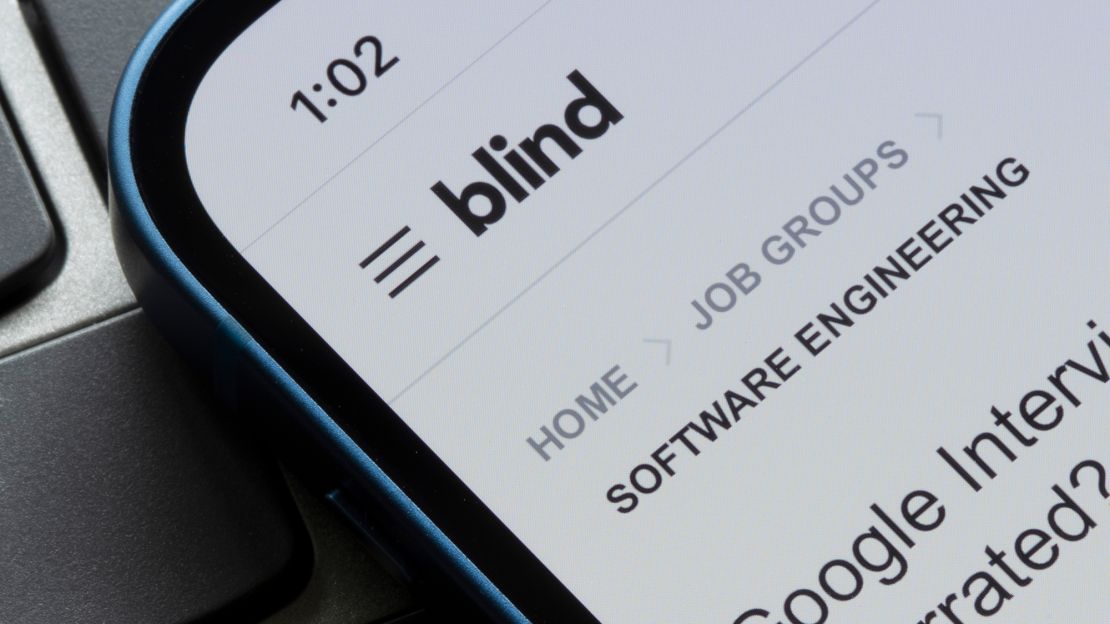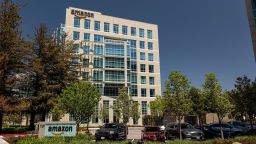In the week before Microsoft publicly announced plans to cut 10,000 jobs, thousands of workers at the tech giant who were eager for any information about the looming layoffs joined a professional networking site — not LinkedIn, which Microsoft owns, but Blind.
Some 6,000 Microsoft (MSFT) employees signed up for accounts on Blind, an anonymous network, between Jan. 13 and Jan. 18, according to internal data shared with CNN by the startup. Employees used the service to speculate about when the layoffs would come, which departments might get hit and comfort those who were concerned.
“We can’t do anything about it,” one user who identified as a Microsoft worker wrote in a comment on Blind. “Just pray that it’s not you and then pray for those who are impacted that they have a cushion to fall back on, can recover quickly and find another job.”
As layoffs have spread across Silicon Valley in recent months, Blind has emerged as a lifeline for tech workers seeking information and advice. What sets Blind apart from LinkedIn — which is also having a moment as more people in tech and media are now #OpenForWork — is that it lets employees commune about their workplace anonymously, often leading to more candid discussions about some of America’s biggest companies. Blind members verify that they work at a particular company by signing up with a work email address.
“Blind is essentially an information-sharing forum for verified professionals, but we had to add anonymity to it because work identity by itself limits the things that you can say about what you think,” Kyum Kim, Blind’s co-founder and chief business officer, told CNN. “I think LinkedIn is a great platform, I use it every day. But you don’t see the content that you see on Blind on LinkedIn, and vice versa.”
“With anonymity,” Kim said, “you can just be really genuine and really transparent.” When it comes to what’s going on at the big Silicon Valley companies, he added, what you see on LinkedIn “is kind of the tip of the iceberg.”
Even a year ago, many of the posts on Blind consisted of tech professionals essentially bragging about eye-popping compensation figures and stock packages from various household names in the industry. Now, Blind is filled with posts from workers comforting each other about how to get through periods of unemployment.
One recent post that has received almost 100,000 views is a nearly 1,800-word essay from a person claiming to be a current Amazon (AMZN) worker reflecting on lessons he learned after being laid off from Uber (UBER) during the early days of the pandemic and how he overcame feelings of failure. There are also dozens of posts sharing tips on how to navigate being laid off while on a visa, as well as general job-hunting tips for those who are let go in the current climate when fewer tech firms seem to be hiring. (Some tech workers have also lamented the pay cut they’d have to take by switching industries.)

The shift in sentiment on Blind captures a broader mood shift in the tech industry as Facebook-parent Meta, Google, Microsoft and others cut tens of thousands of employees combined. Suddenly, an industry full of feted workers who used to post publicly on social platforms about growth hacking, ice baths, and lucrative exits, is now searching for more private forums to commiserate and find information about layoffs.
More than 1,000 Google employees singed up for Blind in the 24 hours after the company announced layoffs this month, according to data from Blind. About 3,000 workers at Meta signed up for Blind on Nov. 8, the day before its layoff announcement was made public, Blind said. In total, Meta, Google and Microsoft each have tens of thousands of verified employee accounts on Blind, according to the startup.
“People talk with their work identities, but it’s actually a very personal platform,” Kim said. “There’s a lot of empathy going on within the community, and that’s why I think people have been helping each other out much more recently than before.”
The rise of Blind in Silicon Valley
Blind was founded by South Korean tech workers in 2013, and launched in the United States in 2014. It was initially modeled after an internal message board used by employees at Naver, South Korea’s version of Google.
“We just all realized that there’s a need for communication that is kind of independent of company control,” Kim said. “Because when employees talk to each other in a work setting, they can’t be honest – and they have to always kind of be self conscious about what the boss is going to think, or what other people are going to think.”
In its early years, Blind emerged as a place where women, minorities and other Silicon Valley outsiders could learn if they were being paid the same as their peers. In 2018, Blind also launched a #MeToo channel that quickly gained popularity as it let women anonymously share their unfiltered experiences navigating male-dominated companies.
The company has raised more than $60 million in funding to date. The service now has more than seven million verified professionals from more than 300,000 companies, according to the company.
Blind told CNN that it has seen a spike in activity in recent months, beginning around late last year when Elon Musk commenced his takeover of Twitter. More than 7,000 verified Twitter employees have joined in total, or a vast majority of the company’s total headcount before Musk began mass layoffs, according to data shared with CNN. Some 1,400 of those Twitter employees joined Blind during the three-week period after Musk completed the acquisition, as speculation over what came next mounted.
While Blind is not exclusively for tech workers, it has become incredibly popular in the industry amid the recent turmoil.
Twitter workers on Blind, for example, check the site an average of four times daily, and Meta workers log on an average of three times a day, according to Blind. Google and Microsoft users, meanwhile, check Blind more than twice a day on average, the company says.
But as Blind has gained traction, it has also had to confront a unique dynamic with Silicon Valley businesses: It is simultaneously looking to provide a safe place for workers to commiserate about their companies anonymously and also find ways to provide paid services to those same companies, some of which may not initially be big fans of Blind.
Inside Blind, Kim says this corporate dynamic is referred to as the “stages of grief.” First, a company’s leaders and human resources department will discover employee grievances on Blind and may get upset or dismiss the issues. Then, as they see it aligns with internal complaints, company officials will eventually come to accept it. Finally, some companies will listen and start incorporating feedback from Blind to make their workplace better.
Blind has launched a series of paid products, including Talent By Blind, which helps tech companies recruit engineers, and Insights By Blind, which aims to let companies better understand employees’ real-time concerns while maintaining the privacy of its users.
Companies using the new Insights by Blind product include Cisco, Gopuff, Roblox and Salesforce, the last of which also recently announced significant layoffs.
Employers “don’t have full knowledge about how they’re perceived in the market, or what their employees are thinking,” said Kim. “We’re filling gaps for them now.”
Because of the spate of layoffs, Blind also created a new type of account for employees who are looking for work and information but have lost access to their former work email address. Rather than label where these people are working, their handle indicates they are “#ReadyForWork.” They can still access the public forums, but aren’t able to access the private company channels available to people with verified company emails.
“Times are tough,” Kim said. “Sharing information has never been more important.”






















